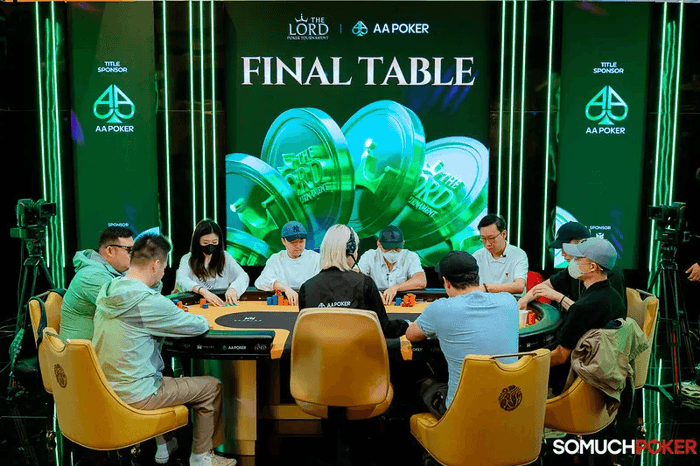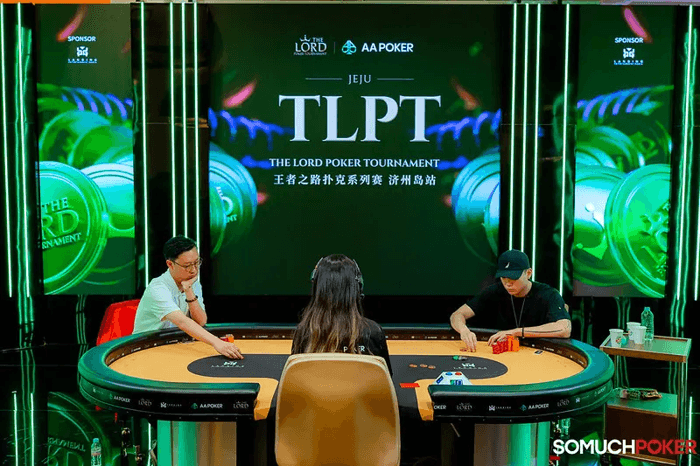lottery Result
Weizheng Zhong rummy apps listWins TLPT Circuit Main Event
Share on Twitter Share on Facebook 4 min read
Table Of Contents
- Final Table Results
- Final Table Action
- Heads-up Action
Sometimes, the cards just fall your way in both poker and in life.
Weizheng Zhong can typically be found grinding poker tournaments in America, but a spur-of-the-moment invitation changed everything. While travelling through China, a friend reached out and suggested he swing by Jeju. Zhong took the offer, hopped into the TLPT Circuit Main Event, and three days later, that impromptu decision paid off in spades as he was crowned the inaugural champion.
For the victory, Zhou takes home the Circuit Main Event trophy and the US$120,000 first-place prize, which was the biggest slice of the $700,000 prize pool.
"It's pretty surreal," Zhou said shortly after winning the event. "It's my first time playing in Asia. I'm feeling very lucky."
Zhong's impressive victory came after navigating a final table that included poker phenom Stephen Song and a seemingly unstoppable Xuecong Wu, who cruised through the final table after winning nearly every meaningful pot he played. At one point, Wu held an over 2:1 chip lead over Zhong during their heads-up battle, but Zhong stuck to his game plan and was able to edge out the win.
"My strategy [against Wu] was to play as much post-flop as I could, so I almost never raised [preflop]," Zhong explained. "I felt I had a little bit of a post-flop edge, and I was able to pull it off in the end."
Final Table Results
| Rank | Player | Country | Prize (in US$) |
|---|---|---|---|
| 1 | Weizheng Zhong | China | $120,000 |
| 2 | Xuecong Wu | China | $65,000 |
| 3 | William Jia | Australia | $47,000 |
| 4 | Fangzhou Zhu | China | $36,300 |
| 5 | Yiyu Zhou | China | $28,000 |
| 6 | Jiaming Zhao | China | $21,000 |
| 7 | Stephen Song | United States | $16,000 |
| 8 | Jin Zeng | China | $12,500 |
| 9 | Huan Wen | China | $9,700 |

Final Table Action
Once players were seated at the final table, an explosive start at the Landing Casino inside the extravagant Shinhwa World Hotel Jeju saw four players eliminated within the first two levels of play.
On the very first hand, Huan Wen took his chances with ace-jack sitting on just seven big blinds and was sent out in ninth after running into Zhong's pocket jacks. Shortly after, Jin Zeng followed Wen out the door after shoving with a dominated ace against Jiaming Zhao's ace-king.
In a shocking turn of events, Song, who entered the final table second in chips, had his aces cracked by Wu in a massive pot to get sent out in an unexpected seventh.
The run-good for Wu kept coming as he scored another knockout against Zhao just a few hands later to soar into the five-handed chip lead.
Play became notably more reserved at that point as the short-stacked players began making snug folds, seemingly trying to out-ladder each other for pay jumps. Meanwhile, Wu continued making hands and chipping up, accumulating nearly half the chips in play with five remaining.

All eyes shifted to William Jia, who had slipped into short stack by a large margin. However, a pair of fortunate double-ups gave Jia new life and left the last lady standing — Yiyu Zhou — as the short stack. With no room left to manoeuvre, Zhou took a stand with jack-ten suited after being shoved into by Zhong, but Zhong held up with king-high to send Zhou out in fifth.
A relatively quiet Fangzhou Zhu managed to pick up kings and score a big double through Wu, only to have Jia double through Zhu twice in quick succession to leave him on the short stack. Wu then paid Zhu back by eliminating him with Big Slick in an all-in preflop confrontation.
Jia's string of double-ups finally came to an end after he shoved with jack-seven into Wu's ace-seven and failed to get lucky, setting up a finale between Wu and Zhong.
Heads-up Action

The heads-up match quickly became a back-and-forth battle, with the chip lead exchanging hands on several occasions. Neither player was interested in raising preflop, which led to an abundance of post-flop action that initially favored Wu.
However, Zhong vaulted into the lead in a pivotal hand wherein Zhong flopped two pair against the open-ended straight draw of Wu. Zhong called a couple of semi-bluffs from Wu, and then Wu paid off a hefty bet from Zhong after making top pair on the river.
A few hands later, Zhong found himself on the brink of victory after getting Wu all in holding king-queen against Wu's pocket fours. Zhong flopped a king to leave Wu drawing to two outs, but Wu ended up turning a set to get back into the match.
Zhong answered right back, however, after a brutal cooler left both players with two-card straights. Zhong held the higher straight and doubled through Wu.
Just a few hands later, Wu moved all in with a king-high hand, and Zhong snap-called with an ace and the chip lead. The board ran out clean, and with that, Zhong emerged victorious as the inaugural TLPT Circuit Main Event champion following a roller-coaster heads-up duel.
Categories
Latest News
- లాటరీ ఫలితాలు – భారతదేశం25-06-01
- Players should also be careful not to hold onto high-point cards for too long because if an opponent declares Rummy, they could have a big effect on the score. As an alternative, concentrating on creating melds with cards that have fewer points can help reduce possible losses while still aiming for victory. These tactics, along with astute observation and flexibility, can greatly increase players' chances of winning at Classic Rummy. 25-06-01
- The Complete Guide to Classic Rummy Classic Rummy is a card game that has been played for generations & has a long and varied history dating back to the early 1800s. The game is thought to have developed from the Spanish game Conquian, which is frequently considered to be the forerunner of contemporary rummy variations. Conquian, which was played with a standard deck of cards, was similar to modern rummy in that it involved melding sets & runs. Gin Rummy & Indian Rummy are just two of the variations that have emerged as a result of the game's many adaptations as it has expanded internationally. 25-06-01
- Although each variation introduced distinct guidelines and tactics, the main goal of creating melds stayed the same. With the turn of the 20th century, Classic Rummy became very popular in gaming parlors and social circles. Particularly during the Great Depression, when families were looking for inexpensive entertainment, the game became a mainstay in American homes. Various rummy tournaments emerged at the same time as card games gained popularity, further cementing rummy's position as a popular past time. 25-06-01
- Dubai Lottery25-06-01
- With the development of Classic Rummy over the years, players from all over the world can now participate in this age-old game through online platforms. Today, its straightforward yet strategic gameplay serves as a testament to the timeless appeal of card games, spanning generations and cultures. Classic Rummy is essentially a game played with a standard 52-card deck & can be played by two to six players. The main goal is to create legitimate melds, which can be runs (three or more consecutive cards of the same suit) or sets (three or four cards of the same rank). 25-06-01
- Also, melding entails timing & decision-making in addition to creating legitimate combinations. As soon as they have a good combination, players should try to meld, but they also need to consider the dangers of showing their hand too soon. Keeping some cards can help you play defense against opponents who are about to declare rummy or open up possibilities for future melds. Players can greatly enhance their performance in Classic Rummy by refining their melding abilities via observation and practice. Comprehending the Classic Rummy point system is crucial for both scoring and strategy development during gameplay. 25-06-01
- Drawing and discarding are crucial moves in Classic Rummy that have a big impact on how the game turns out. Players can strategically build their hands by drawing cards from the stockpile or the discard pile, and they can control their total point total by discarding unwanted cards. In addition to stopping opponents from finishing their melds, a well-timed discard can let them know which cards you might be chasing. Therefore, keeping an advantage in the game depends on knowing when to draw and when to discard. Players also need to think about how their discards will affect the tactics of their opponents. For example, it might unintentionally help another player finish a meld if a player discards a card that is being collected by that player. 25-06-01
- গোয়া রাজ্য লটারি25-06-01
- The Complete Guide to Classic Rummy Classic Rummy is a card game that has been played for generations & has a long and varied history dating back to the early 1800s. The game is thought to have developed from the Spanish game Conquian, which is frequently considered to be the forerunner of contemporary rummy variations. Conquian, which was played with a standard deck of cards, was similar to modern rummy in that it involved melding sets & runs. Gin Rummy & Indian Rummy are just two of the variations that have emerged as a result of the game's many adaptations as it has expanded internationally. 25-06-01
Contact Us
Contact: e
Phone: 020-123456789
Tel: 020-123456789
E-mail: [email protected]
Add: 联系地址联系地址联系地址

 wpkq
wpkq